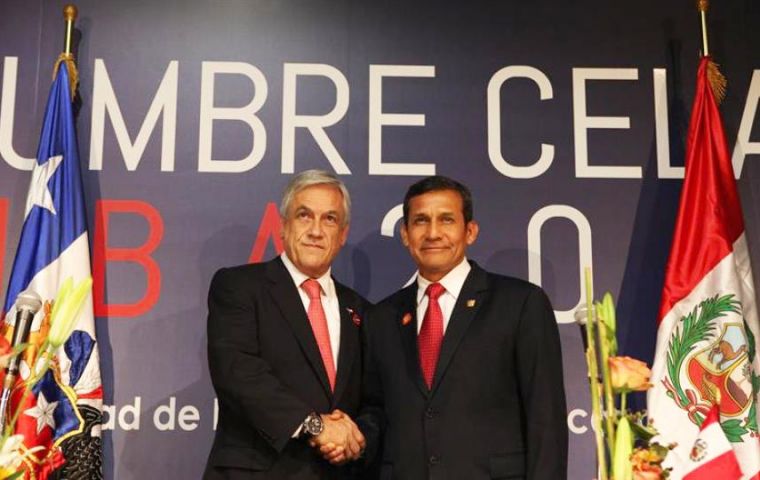MercoPress. South Atlantic News Agency
Peru and Chile committed to 'gradual and timely' implementation of maritime border ruling
 Piñera and Humala made a display of unity and appeasement
Piñera and Humala made a display of unity and appeasement As the echoes of Monday’s International Court of Justice (ICJ) continued to reverberate in Santiago and Lima, Presidents Ollanta Humala and Sebastián Piñera of Peru and Chile met on the sidelines of the CELAC (Community of Latin America and Caribbean States) summit in Havana in a show of unity.
As some question marks began to crop up about the implementation of the ICJ’s decision and politicians on both countries made strong declarations, Humala and Piñera met for over an hour and issued a joint statement that evoked a spirit of cooperation that matched the overarching themes of the CELAC summit.
However Peruvian politicians insisted that the ICJ’s decision was already in effect and that implementation had to go ahead immediately. In fact, Peruvian war and research vessels on Tuesday entered the area of the sea awarded to Lima that had previously been considered international waters by Chile. President Humala himself reportedly spoke to the captains of the ships and monitored their progress.
Meanwhile, Chile’s agent to the ICJ, Alberto van Klaveren, argued that Peru had to first amend its Constitution to bring it in line with the statutes of the Convention of the Sea, as specified by the ICJ’s ruling. In response, the President of the Peruvian Congress, Fredy Otárola, said to local media that the ICJ’s decision did not in any way call for any modifications to any existing Peruvian legislation.
The differences in opinion are important because it affects the timetable for implementation of the ruling. While Chile has expressed its disagreement with the ruling but its willingness to implement it, it has also advised that the implementation cannot be immediate.
In a statement just as salomonic in intent as the ICJ ruling, Piñera and Humala called for a “gradual and timely” implementation for the decision in “good faith.”
They also announced that they will each participate in “2+2” meetings with their respective foreign and defense ministers to administer the implementation.
Piñera was accompanied by President-elect Michelle Bachelet during the meeting. Bachelet’s administration will be primarily responsible for the implementation of the agreement and so far her statements on the matter have mirrored Piñera’s stance.
Piñera and Humala finalized their statement by reaffirming their commitment to cooperation and expressed their wish that the ruling would help bury this uncomfortable and acrimonious element of their shared history.




Top Comments
Disclaimer & comment rules-

-

-

Read all comments“Peruvian war and research vessels on Tuesday entered the area of the sea awarded to Lima that had previously been considered international waters by Chile”
Jan 31st, 2014 - 07:08 am 0So it doesn't matter then.
evoked a spirit of cooperation that matched the overarching themes of the CELAC summit.
Jan 31st, 2014 - 11:20 am 0so CELAC thinks it a good decision to go to the ICJ,
then perhaps CELAC should encourage CFK to go to the ICJ instead of dragging south America down to her level..
'In a statement just as salomonic in intent as the ICJ ruling ...'
Jan 31st, 2014 - 12:20 pm 0No! No! Salomonic Rulings are too much for Scotland; trust me, you don't want to export the Judgements of Salomond to South America!
Commenting for this story is now closed.
If you have a Facebook account, become a fan and comment on our Facebook Page!